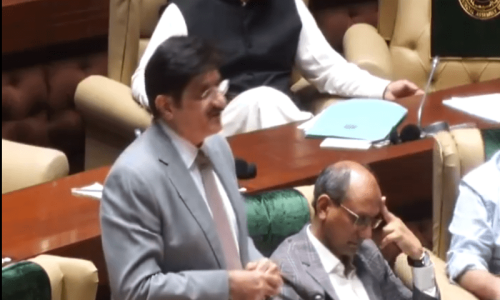 KARACHI, Aug 24: With the splitting of the grounded ship Tasman Spirit on Friday, which added to the huge oil spill in to the sea, the conditions along the coastal belt started to deteriorate, enhancing the miseries of area residents, along with threats to the environment.
KARACHI, Aug 24: With the splitting of the grounded ship Tasman Spirit on Friday, which added to the huge oil spill in to the sea, the conditions along the coastal belt started to deteriorate, enhancing the miseries of area residents, along with threats to the environment.
As the volume of the spillage increases, the fears of the environmentalists regarding a major ecological disaster in the area are becoming a reality, though the government agencies are continuing with their claims that everything is under control, and the situation is being tackled by ‘experts’. But the gravity of the disaster is said to be so great that it could not be pushed under the rug, anymore.
The worst-hit areas, so far, are the beeches of Shirin Jinnah Colony, Clifton, Sea View etc, but with the increased quantity of oil oozing out of the Greek-registered ship, the oil slick has started to move further eastwards to the Korangi creek, Bundal Island and Port Qasim, in the direction of the Indus Delta.
A resident of the Sea View Township, Atif Bokhari, said that the oil smell, which had subsided slightly in last couple of days, had once again become unbearable, since the Saturday morning, and all the residents had shut down their windows to avoid the pungent smell.
He said that people were having health problems and suffering from nausea, dizziness, indigestion and vomiting, besides having respiratory track complications. He said that people having cardiac problems, asthma, etc were more affected. He said that the elderly, women and children suffered more.
Another resident, Zulfiqar Ali, lamented that the oil-soaked beach was littered with dead fish, crabs, and other dead marine animals and looked dirty, adding that the seawater and the beach had turned dark brown and blackish, with small pools of oil at some places.
Another resident, Mohammad Shahid, said that many a residents of the area, who had relatives in the city, or who could afford, had migrated to others parts of the city and were waiting for the time till the environment in the area became normal. He said that extended exposure to contaminated air would adversely affect the health of the residents.
The residents also criticized the communication minister and the KPT chief, who, despite worsening of the situation with each passing day, were issuing ‘consoling’ statements and were holding back the details “in the national interest.” They deplored that the pilot and the captain of the grounded ship were not being presented before the Press to give the first-hand information regarding the grounding incident to the public, raising suspicions that there was something fishy.
The residents also flayed authorities concerned for first hiding the facts from public and then delaying the salvage operation. They were of the opinion that if the agencies like the KPT and Sindh Environmental Protection Agency had been headed by technically qualified people, the tragedy would have been quickly responded to, minimizing the effects of the disaster.
The chief of Sindh Wildlife Department’s Marine Turtle Conservation Project, Fahmida Firdous, said that she alongwith other wildlife experts had been visiting the beeches daily to monitor the effects of the oil contamination, which looked more severe on Saturday.
She said the team found bodies of fish, marine snakes, reptiles, crabs, lobsters, shell fish, oysters, star fish etc, littered along the coast.
She said that after digging at a few places on the sandy beeches, the wildlife team discovered that the oil had seeped down to the depth of nearly three feet, contaminating the sand.
She said that they have collected a large number of samples of dead fish, etc and also collected the samples of sand from eight sites, from various beeches, to carry out research and to find out the effects of the contamination.
She said that the team found an oil-soaked water bird, early on Saturday morning, at the Shirin Jinnah Colony beach where more oil seemed to be coming on Saturday. She said that she had brought the waterfowl to the office and it was being cleaned for over a couple of hours but the thick crude oil was just not leaving the bird’s body.
She said that luckily the oil had not moved towards the sandy beaches of Sandspit and Hawkesbay, where the extremely rare species of marine turtles — Green Turtles and Olive Ridley — came for egg-laying, and the next door rocky shores of Buleji, Paradise Point and Cape Montz, which were the feeding grounds of the turtles, were also safe.
Deputy director general of the WWF, Dr Ejaz Ahmad, said that the oil forms a layer on the extensive aerial root system of the mangrove trees harming them seriously.














































Dear visitor, the comments section is undergoing an overhaul and will return soon.